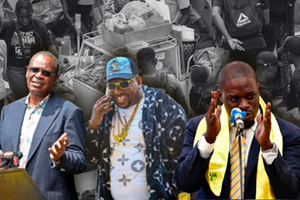
Corruption stands in the nation’s journey to job creation, food security, poverty eradication, amongst others.
President Ruto is promising – oh my – administrative action against corruption. He wants to change the laws so that corruption cases are heard and determined in six months, enhance witness protection so that more whistle blowers come forward to report economic crimes and digitise public procurement for greater transparency. I know many Kenyans will be cynical about these promises given that the Kenya Kwanza administration is up to its neck in the muck, but I take an uncharacteristically optimistic view.
I think the President’s thinking is in the right place, he is beginning to see the really important things facing the country. Of course the measures are a fart in the roaring storm; massaging the legislation is not going to make a dent in Kenya’s corruption scene. But at least he is acknowledging that we have a serious problem that needs to be addressed. Kenya will never, ever, develop with the kind of attitudes we have today.
Neither the population nor their leaders seem alive to the reality that prosperity does not depend on how much money you make, it is a question of how much you spend. If your expenditure is always ahead of your income, it does not really matter how much you are making, you will never make a step forward. Given the corruption scandals and the hilarious stories of governors and Cabinet Secretaries being detained in foreign countries with briefcases stashed with cash, we know we have an Abacha-type feeding frenzy.
Corruption in Kenya can only be eliminated by an electoral coup against the root and branch of the existing corrupt political class, the entire system. What needs to be uprooted is not just the people in offices today, some of whom are captives of the system they found, it is the very ideas which are the foundation of politics and government in Kenya. A lot of people go into politics to steal from the public – though this will be called other names like “business” or “making money” or “tenders”.
It is accepted that it is OK and “industrious” to ruthlessly “make money from the government” which is euphemism for stealing from the people, robbing them of their dream to build a gentler, more nurturing society. Until you change that reality, you can talk about tackling corruption all you like, but that’s all you will be doing: talking. The second reason corruption is impossible to eradicate is that we are constantly misdiagnosing the problem. We target the leaders and the corrupt, often the two are the same thing, but these are merely the symptoms.
The cause of the malaise is that Kenyans are unable to govern themselves, they are incompetent at selecting the people to whom they delegate their sovereign power. Why? Four reasons. First, Kenyans are unable to recognise their own interests. They think their interests are served if somebody from their tribe is in office. If there are two million of you, surely your kinsman can’t give all of you jobs and tenders. So he eats on your behalf. Because you failed to realise that your interests are societal, shared by all, not selfish ethnic ones, you lose.
Two, Kenyans are unable to judge the character of leaders dispassionately. They are easy to bamboozle and con during the election. They follow waves without a careful analysis of the candidate and his platform. Third, ordinary Kenyans are themselves dishonest and steeped in corruption. They see nothing wrong in it, given the chance they would be as corrupt as those they condemn for graft.
A trader friend of mine was outraged the other day because villagers wait for his truck on a hill, run after it, break the lock and steal avocados. In a recent Al Jazeera documentary on gold smuggling, a white Zimbabwean advises some Asians: “Don’t do business with the ‘blek guys’, they are always lying.” And he was right. How many Kenyans have been cheated by family members and “friends” whom they trusted and gave money to?
They lie they are building a house for you, so you slave in Houston doing three jobs and napping at the traffic stop, yet the photos they send you are from a project, not Ikinu in Kiambu where your plot is, but in Kasipul Kabondo that they have been downloading from Facebook. There was an Englishman who recently lost his pension to a Kenyan friend. The friend pretended to be a lovely lady who slowly warmed her way into the poor, broken guy’s heart.
The pensioner had recently lost his wife. Again there was that dance of building houses, the sending fake photos and endless lies.
Finally, Kenyans make no judgements about money. All of it is ok, even if one has to worship the devil to get at it. And people with money are holy, they can do no wrong, even when everyone knows they had to rob widows and orphans to “make it”.
So you see, the problem is a lot worse than a few big men eating on a railway tender or selling an airport here and there - or mothballed laws that no one pays any attention to. The good news? We all get to be part of the solution.







